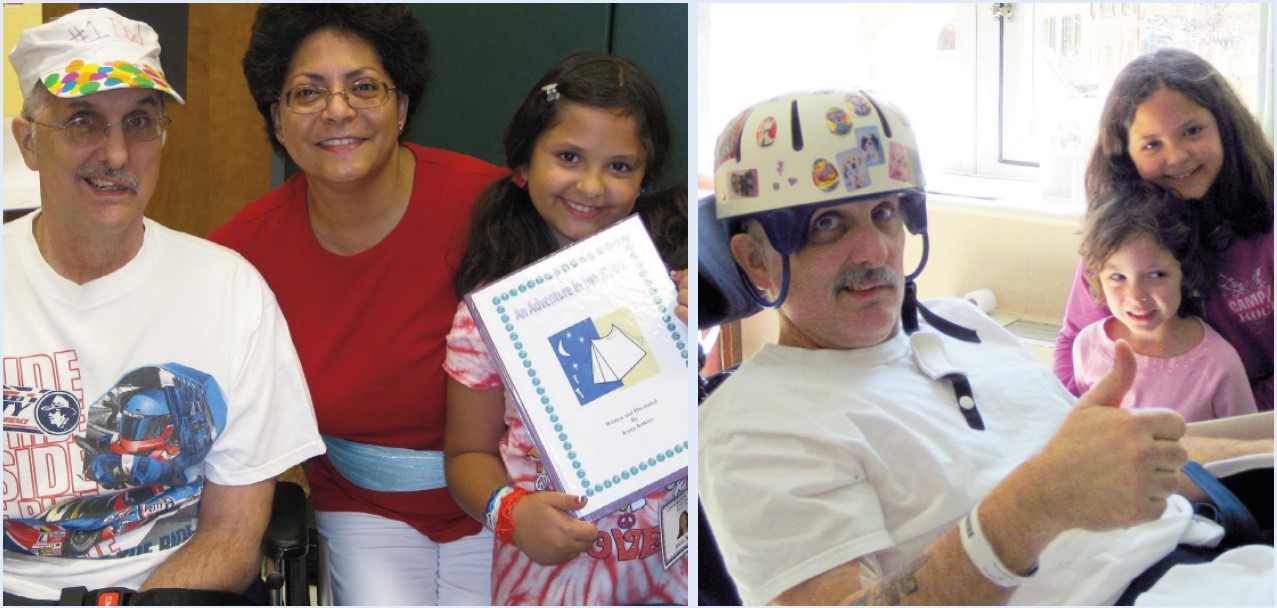danced and sang in an empty cafeteria at the hospital for him. He cheered loudly and proudly, like always.
As time went on, and he returned home, my mom became his primary caregiver. It was strange having him sleep in our dining room, in a hospital bed, instead of upstairs in his bedroom. One day, my mom woke me up frantically, worried about him. We ran downstairs and he was having a seizure.
"I remember waking up in the middle of the night and yelling out, but that's about it," he says. "When I woke up in the hospital after my seizure, I actually asked the doctors if I had another stroke, because I had no idea what had happened."

BEFORE THE FALL: (Above left) The author with her dad, prestroke, and mom, proud and excited to show the book she wrote at her elementary school's "Author's Night;" (Above right) The author's dad, post stroke, wearing the helmet that she and her sister covered with stickers. He loved his helmet and wore it proudly until it was safe to continue on without it.
After a traumatic brain injury (TBI) such as a stroke, one may suffer from seizures. We had no idea about this, until he had his. Over the next few years, I helped my mom out in any way that I could. I would help my dad get dressed, cut up his food and push him around in his wheelchair. It was a very difficult transition, because I was so used to being the one that was cared for, not the one doing the caregiving.
My dad was getting stronger, his memory was getting better, and at last, we would eat dinner together at the kitchen table again, for the first time in forever.
“It broke my heart not to be able to play with you and Jazzy like before,” he says. Reminiscing, he said “I remember one time, you and Jazzy were outside playing basketball and running around. I was happy just to be out there with you girls. Then, your mom called us inside for dinner, and we all ate tacos together as a family. Family time means everything to me.”
In less than two years, my dad had gone from being on his
deathbed, to coming home and using a wheelchair, to using a walker and cane, to then being able to walk on his own. While his left arm has never moved much, besides slowly opening and closing his hand after therapy, his left leg was able to move enough to where he could carefully walk with a limp.
As I grew older, anger and bitterness began to grow inside of me. Nothing felt fair. It took me a long, long time to focus on the ability in disability. Sometimes it's just hard to focus on the good when it feels like so much bad is surrounding you.
Before the stroke, my dad was always playing sports, heavy-lifting and running around with his kids 24/7. It absolutely crushes him that
all of that was robbed from him so abruptly. However, in my eyes, he's stronger than ever. I don't know anyone else who could survive and thrive through all of this the way he has.
Now I am a huge advocate for the disability community, and realize that everyone's stories and perspectives are so vastly different.
My dad offers advice for anyone dealing with a similar situation, "Try to prioritize being surrounded by good people, because otherwise it's easy to fall into depression, and always remain a fighter, no matter what."
“IN MY EYES, MY DAD IS STRONGER THAN EVER. I DON’T KNOW ANYONE ELSE WHO COULD SURVIVE AND THRIVE THROUGH ALL OF THIS THE WAY HE HAS.”
Speaking of good people surrounding my dad, everyone – friends and family – told my mom that it wouldn’t be plausible for him to come back home after the stroke, and that my mom should place him in a nursing home. She refused. I have never seen such fierceness in a person like my mother. She fought every day for my sister, my dad and me. As for his nurse, Pat, she is honestly the reason why he is still alive after getting diagnosed with cancer. She takes care of him as if he is her family. She’s the best nurse ever.